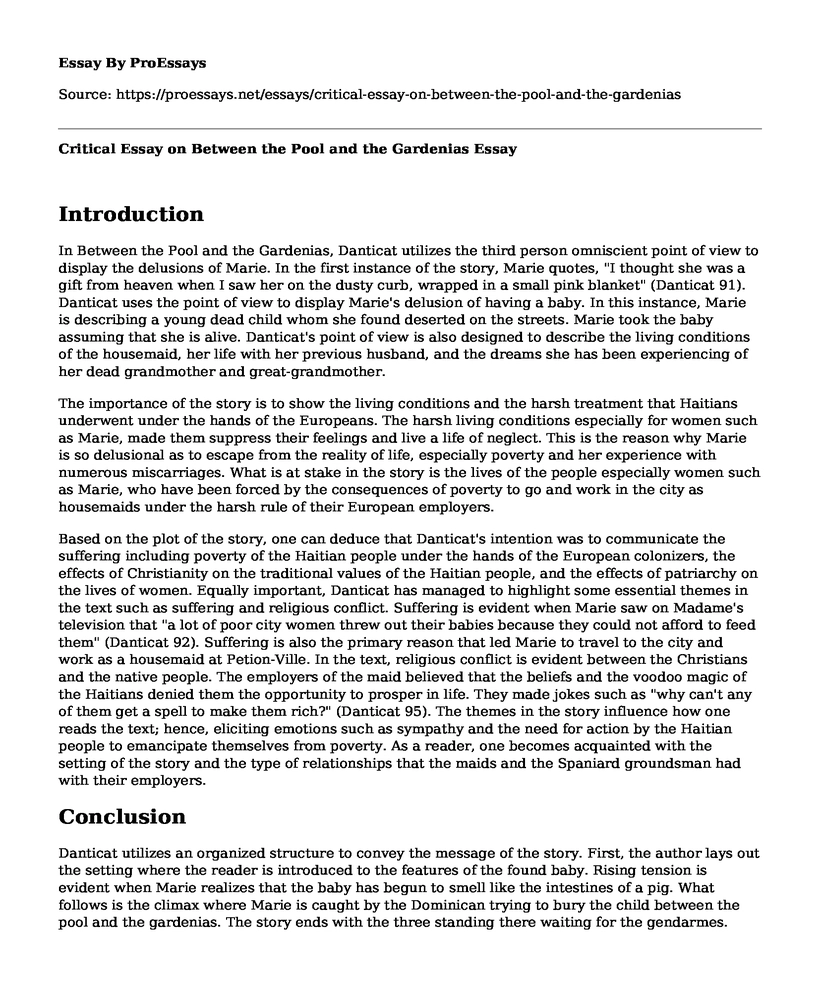Introduction
In Between the Pool and the Gardenias, Danticat utilizes the third person omniscient point of view to display the delusions of Marie. In the first instance of the story, Marie quotes, "I thought she was a gift from heaven when I saw her on the dusty curb, wrapped in a small pink blanket" (Danticat 91). Danticat uses the point of view to display Marie's delusion of having a baby. In this instance, Marie is describing a young dead child whom she found deserted on the streets. Marie took the baby assuming that she is alive. Danticat's point of view is also designed to describe the living conditions of the housemaid, her life with her previous husband, and the dreams she has been experiencing of her dead grandmother and great-grandmother.
The importance of the story is to show the living conditions and the harsh treatment that Haitians underwent under the hands of the Europeans. The harsh living conditions especially for women such as Marie, made them suppress their feelings and live a life of neglect. This is the reason why Marie is so delusional as to escape from the reality of life, especially poverty and her experience with numerous miscarriages. What is at stake in the story is the lives of the people especially women such as Marie, who have been forced by the consequences of poverty to go and work in the city as housemaids under the harsh rule of their European employers.
Based on the plot of the story, one can deduce that Danticat's intention was to communicate the suffering including poverty of the Haitian people under the hands of the European colonizers, the effects of Christianity on the traditional values of the Haitian people, and the effects of patriarchy on the lives of women. Equally important, Danticat has managed to highlight some essential themes in the text such as suffering and religious conflict. Suffering is evident when Marie saw on Madame's television that "a lot of poor city women threw out their babies because they could not afford to feed them" (Danticat 92). Suffering is also the primary reason that led Marie to travel to the city and work as a housemaid at Petion-Ville. In the text, religious conflict is evident between the Christians and the native people. The employers of the maid believed that the beliefs and the voodoo magic of the Haitians denied them the opportunity to prosper in life. They made jokes such as "why can't any of them get a spell to make them rich?" (Danticat 95). The themes in the story influence how one reads the text; hence, eliciting emotions such as sympathy and the need for action by the Haitian people to emancipate themselves from poverty. As a reader, one becomes acquainted with the setting of the story and the type of relationships that the maids and the Spaniard groundsman had with their employers.
Conclusion
Danticat utilizes an organized structure to convey the message of the story. First, the author lays out the setting where the reader is introduced to the features of the found baby. Rising tension is evident when Marie realizes that the baby has begun to smell like the intestines of a pig. What follows is the climax where Marie is caught by the Dominican trying to bury the child between the pool and the gardenias. The story ends with the three standing there waiting for the gendarmes. Overall, the structure utilized by Danticat is well developed, concise, and easy to follow and understand. Moreover, it helps create a smooth flow of ideas and scenes within the story.
Works Cited
Danticat, Edwidge. "Between the Pool and the Gardenias." Krik? Krak?, 1995), pp. 89-100.
Cite this page
Critical Essay on Between the Pool and the Gardenias. (2022, Jun 19). Retrieved from https://proessays.net/essays/critical-essay-on-between-the-pool-and-the-gardenias
If you are the original author of this essay and no longer wish to have it published on the ProEssays website, please click below to request its removal:
- Billy Bishop Goes to War
- The Dangers of Being Judgmental - Literature Essay Example
- Paper Example on Unveiling W. Edwards Deming: Author of 'Out of the Crisis' and Other Books
- Essay Example on Yingying and Zhang: A Tale of Tragic Love
- Essay Example on Neverhome: Exploring Power Through Dispositional Characteristics
- Essay Sample on The Yellow Paper: A Woman's Battle Against Oppression in 1892
- Research Paper on Langston Hughes: A Literary Icon and Champion of the Arts







